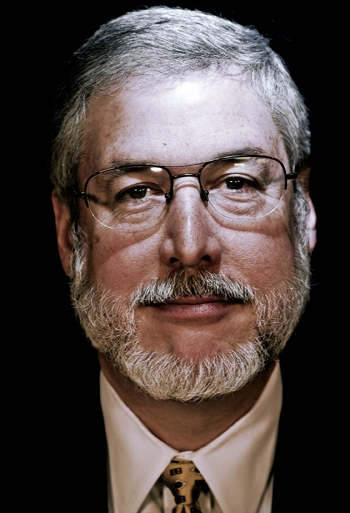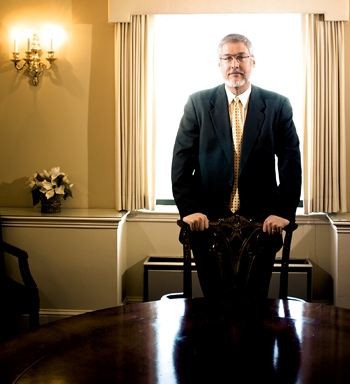
Congressional hearings often are predictable and orchestrated. Many lawmakers are scripted and aren’t deft at asking questions or following up with inquiries that shed light. Witnesses are tutored to avoid making waves, to be deferential, and to put the best face on whatever they’re asked about. So it was noteworthy when, on a summer day near the end of the George W. Bush administration, David Addington, then chief of staff to Vice President Dick Cheney, ditched the usual modus operandi when he testified before the House Judiciary Subcommittee on the Constitution. He was combative, sarcastic, and condescending.
Initially, the Vice President’s counsel had resisted making Addington available, but the lawyer agreed to come in response to a subpoena. Fiercely loyal to the Vice President, for whom he had served as a legal adviser, Addington often had been dubbed Cheney’s alter ego or Cheney’s Cheney. He was the point man in developing the legal rationale for the administration’s controversial policies after the September 11 terrorist attacks.
His fingerprints were said to be on the legal analysis that justified secret presidential actions, from eavesdropping on US citizens without court approval to sanctioning harsh treatment of detainees captured in the so-called war on terror.
Because of his reputation as a hard-driving advocate as well as his proclivity to eviscerate those who raised questions about his—and Cheney’s—expansive view of the powers of the President after 9/11, it was no surprise that Addington’s appearance provoked interest. His power-behind-the-throne image was summed up by an unnamed former White House official who described Addington to U.S. News as “the most powerful person no one has never heard of.”
Addington’s appearance before the Judiciary subcommittee was notable for another reason: He routinely eschewed the spotlight or anything else that brought scrutiny to himself. While many Washington movers and shakers covet media attention, Addington had little use for it.
His performance at the hearing reinforced his image as all too willing to use an acerbic style to make his case. Sticking it to members of Congress wasn’t exactly a selling point to prospective employers when, six months later, at the end of the Bush administration, Addington found himself looking for work.
Next: A man with a glowing resume—and lots of baggage
Even with a golden résumé that included a tour as general counsel at the Pentagon and his widely acknowledged skills as a lawyer, Addington had lots of baggage. His reputation as an intellectual bully made an impression on the Washington legal establishment.
Ultimately, he landed a position in one of the nation’s largest think tanks, the conservative Heritage Foundation. He was named vice president of the Domestic & Economic Policy Division last September, more than a year and a half after leaving the White House.
Addington recently sat down with The Washingtonian for two interviews, his first since joining Heritage. He showed a serious, tough, but polite and even amiable demeanor. At times he questioned the premises of questions. He was precise in his responses. He never got riled or showed the combative side that many others have seen. Though guarded, he seems to have turned a page.
Apparently suspicious of how recordings of the interviews might be used, he prohibited taping. A Heritage spokesman promised that Addington would speak slowly.
At times, his approach provoked head scratching. He parried questions about the “powerful Dick Cheney,” saying, “I disagree with the premise.” He claimed that the office of the Vice President has “no power in a legal sense, no authority.” To the extent it has influence, he said, that’s “a function of whether you are persuasive or not. A President doesn’t have to listen if he doesn’t want to.”
Addington had lots of baggage. His reputation as an intellectual bully made an impression on the Washington legal establishment.
All of that is true as a history lesson on the weakness of the Vice President’s office. After all, one of the most familiar historical aphorisms came courtesy of John Nance Garner, who served under FDR and said of his office: “The vice presidency is not worth a bucket of warm spit.”
But in the context of Cheney’s tenure under George W. Bush, it seems ridiculous to think in those terms. It’s a pretty good bet that virtually all historians would rate Cheney as one of the most powerful Vice Presidents in history, if not the most. It took a while—until the second interview—for Addington to acknowledge that, yes, Cheney was quite influential with Bush.
When Addington was asked about the most widely circulated criticism of him—that he had an extraordinarily expansive view of presidential powers—he again parried, saying he only did what all good lawyers do in representing their clients; he had been just as aggressive in protecting Congress’s interests when he worked on Capitol Hill: “My job as an attorney with all clients, [whether] House committees or a Vice President of the United States, is to zealously advocate the interests of my clients within the bounds of the law.”
There were other quibbles. But while Addington’s intensity is obvious, he also seems to have put his sharp elbows down. Whether that’s a temporary move to beguile a journalist in a rare interview or is a real change in style remains to be seen. What’s clear is that F. Scott Fitzgerald was wrong: There are second acts in American lives.
Next: Addington's testy Congressional hearing
When Addington went to Capitol Hill to testify on that day in June 2008, he wasn’t weighing his words to make a good impression with either his questioners or prospective employers. It seemed he couldn’t have cared less what anyone thought.
Subcommittee chair Jerrold Nadler, a New York Democrat, asked whether he believed that the President could authorize any interrogation technique of detainees in the war on terror, even if the methods crossed into torture. Addington quibbled with the question’s formulation, then insisted it needed a factual basis. Finally, he essentially told the lawmaker to buzz off. Nadler refined the question to inquire whether Addington agreed with one of the other witnesses, former Justice Department lawyer John Yoo, that it would be proper and legal to torture a detainee’s child to extract information in certain circumstances. “I am not here to render legal advice to your committee,” Addington said. “You do have attorneys of your own to give you legal advice.”
He was similarly dismissive when Judiciary Committee chair John Conyers, a Michigan Democrat, pressed him to explain the “unitary theory of the executive,” a view of official power that Addington was reported to have promoted relentlessly. Essentially, it said the President has sweeping authority to discharge his duties as leader of the executive branch and that Congress can’t intrude on the manner in which he carried out those functions.
“I frankly don’t know what you mean by unitary theory of government,” Addington said as he sparred with the committee chairman. When he referred Conyers to certain Justice Department opinions in which the term was used, the usually amiable lawmaker snapped, “I don’t need you to interpret to me what other people have [said].”
The exchanges got so hot that Republican Representative Steve King of Iowa urged everyone to “take the temperature down in here just a little bit.” But the ill will didn’t subside. Addington patronized Democratic representative Debbie Wasserman Schultz of Florida, offering to help her rephrase her questions to focus on areas he knew more about. She retorted: “I am pretty clear on why I am asking you the questions.”
"You're reaction on the inside is 'This is the kid in the supermarket who is going to embarrass his mother and lie down and kick and scream.'"
Nadler later described Addington’s performance as “smug.” His style was so striking that snarky Washington Post columnist Dana Milbank devoted a column to it, headlined when anonymity fails, be nasty, brutish and short.
A source familiar with the episode says Addington was “angry” and “bitter” that the White House hadn’t fought to prevent him from having to testify.
The administration didn’t invoke executive privilege, either. “There was no doubt that he was going to go up there and prove that this had been a bad idea,” says a former colleague. “And he did. All of us looked on with horror and disbelief. His physical bearing—elbows on the table, leaning forward towards the mike—it was like he was going to jump the table and go after them. Your reaction on the inside is ‘Oh, he is behaving like a brat. This is the kid in the supermarket who is going to embarrass his mother and lie down and kick and scream.’ ”
An observer of many Washington policy wars says in an interview that Addington all but raised his middle finger to the committee. “I remember watching this thing and thinking I have never seen anybody talk to a congressional committee like this,” the source says. “It was gutsy. He was not afraid of what they could do to him. That is just a really interesting personality type.”
Next: The rocky path to a new job
“Gutsy and tough” may play well from a White House perch, but it’s not a career enhancer. Having an “interesting” personality as well as successes in behind-the-scenes battles to advance Cheney’s policy preferences took a toll. The hearing blew Addington’s cover, laying bare his prickly personality and tying him to the administration’s increasingly unpopular policies. He also faced the reality that his political patron’s approval ratings were down. And he left some White House colleagues he had battled bloodied and battered.
Fast-forward to today and Addington seems different from his image. Asked whether the job hunt was tough because of animus toward him, he demurs: “Not hostility to me personally. I’ve been in and out of a couple of White Houses—my sense is that [the experience is different] for staffs of Presidents and Vice Presidents who stay till the end. The average stay is 18 months to two years.”
You pay a price, he says, for sticking around after an administration’s approval ratings have plummeted: “That’s one of the choices you make, and people for whom I have great regard could have gone out and done something [to make lots of money] but they made a commitment and stayed until the end. By and large, everybody settled in over time.” The President and his staff need you at the end just as much as at the beginning, he says.
But embarking on his post-White House career wasn’t easy: “I looked for a job and did projects for law firms and associations while I searched.”
Interviews with people familiar with the job market and with Addington say his explanation about the difficulties of the job hunt for those who remained until the end of the Bush administration is too benign. Sure, there’s a toll, but each case was different. Former attorney general Alberto Gonzales had trouble landing a position in part because of his showdowns on Capitol Hill over his inability, among other things, to explain why he’d approved the dismissal of a number of US Attorneys. He eventually resigned in 2007. Two years later, he was working as a recruiter for minority students and teaching a political-science course at Texas Tech University.
Addington’s path to a prestigious law firm was impeded more by the risk-averse nature of those who run the firms.
“Law firms are businesses as well, and the vast majority of their clients would rather be out of the press than in the press,” says Bruce Fein, who worked with Addington in 1987 on the House-Senate committee investigation of the Iran-Contra scandal and served as an associate deputy attorney general in the Reagan administration. “They want to be under the radar screen. They are worried about losing all sorts of clients if Addington worked on this case or that case. It isn’t worth it.”
Stories of Addington’s bullying style, especially toward colleagues in the White House who questioned his expansive view of presidential powers, circulated widely. Former colleague Jack Goldsmith, who headed the Justice Department’s Office of Legal Counsel, wrote in The Terror Presidency: “Addington’s seemingly superior knowledge combined with a fierce temper, a sarcastic manner, and the Vice President’s implicit backing make him an intimidating and effective advocate.” After many clashes with Addington, Goldsmith resigned his post after less than a year.
“What was written about him and his style is much more anathema in the corporate world than people think,” says a source who knows Addington and how Washington’s law firms operate. “It is not the way business is run. They don’t have their senior people behaving that way at meetings.”
“People will not want to associate with firms simply because he is a symbol of—whether you want to call it waterboarding or the abuses of the executive branch during the Bush administration,” Fein observes. “It doesn’t mean that all people feel that way, but if you are very, very conservative, you are shy about any kind of controversy.”
Former US solicitor general Ted Olson says it’s not uncommon for people leaving controversial posts to suffer in the job market. Sometimes they’re “a little bit radioactive,” he says. “Some people get lucky and escape any kind of that sort of thing, and some people don’t.”
Next: Heritage brings a second chance
Addington ultimately found a new home at Heritage, which is unabashed in its conservative philosophy and nonstop marketing to its primary audience: lawmakers and staff on Capitol Hill.
“Heritage is, in my judgment, the preeminent think tank,” Addington says. “Our mission is to formulate and promote conservative policies.” He ticks off the five basic tenets that everybody who works at Heritage can recite as its touchstone: free enterprise, limited government, individual freedom, traditional American values, and a strong national defense. “These are the things I believe in. I have had an interest in serving my country in my career—this work is mighty close to that.”
When asked about the ferocity of his critics, Addington in effect shrugs. He won’t respond to specific characterizations of his actions in books or newspaper stories: “As a general practice, I think it’s best not to address remarks by individuals [about] what you are alleged to have done or not done—it’s just not a good idea. I’m old school on that subject. So you sometimes have to sit and take it. Where you advise senior officials, you are not free to talk about advice you gave and debates. They need to have people around them with whom they can have conversations in candor and get honest, unvarnished advice.”
"It's best not to address remarks by individuals [about] what you are alleged to have done or not done. So you sometimes have to sit and take it."

But why are there so many accounts of people who saw him as a bully? “I reckon it depends on who you ask,” he says. “If you talk to people who agree with me and are persuasive, you’ll find they like me. Those who are not persuasive in a meeting tend to be people who continue that argument in the press.” He adds he’s “not sure” their view of “who’s naughty and who’s nice is reflective of reality.”
But it’s not just people with lingering grudges who have taken aim at Addington. Even former Secretary of State Colin Powell took a shot, according to a report by the New Yorker’s Jane Mayer. After reading about Bush’s decision to authorize eavesdropping on American citizens without approval from the Foreign Intelligence Surveillance Court, as the law required, Powell said: “It’s Addington. He doesn’t care about the Constitution.”
Addington responds by stressing that Powell “was quoted as having said that.” But Addington isn’t suggesting the reporter manufactured that quote, is he? He says he isn’t disputing it—just noting that it was a quote that had been reported. “I have a very high opinion of Colin Powell—he was a terrific chairman of the Joint Chiefs of Staff,” Addington says, adding that Powell’s life is “truly remarkable, both in his personal story and abilities.”
It’s the one time in our interviews that Addington takes time to defend himself from what he sees as an unfair attack: “In my entire government career, I have been dedicated to faithfully carrying out the oath to support and carry out the Constitution. Plenty who disagree with me, whether they liked me or not, would not think I didn’t care about the Constitution.”
And then Addington—who says he has read many of the books that have depicted the Bush years—shows off his keen memory. He says that Goldsmith, in his book, took issue with Powell’s characterization, too. Indeed, Goldsmith wrote that if Powell had said that, “he was wrong. Addington always carried a tattered copy of the Constitution in his coat pocket and would often pull it out and quote from it with reverence.”
Next: What hiring Addington means for Heritage

Asked how he came to land in Heritage’s domestic-policy shop, Addington points to his experiences working on non-security issues in jobs inside and outside of government. “As chief of staff to the Vice President, I dealt with the full range of issues,” he says. “Also in the private sector, nearly all my work was in domestic policy—particularly transportation and communications.”
Still, that’s not the work that stands out on his résumé. He was a special assistant to then–Defense Secretary Cheney before becoming general counsel at the Pentagon. Before that, he served as an assistant general counsel at the CIA, Republican staff director for the Senate committee on intelligence, and GOP counsel for the House committees on intelligence and foreign affairs and the committee to investigate Iran-Contra. By contrast, his domestic-policy experience came as senior vice president and general counsel to the American Trucking Associations and as a partner in one law firm and of counsel to another.
Longtime Heritage president Edwin Feulner puts it a bit differently when asked why Addington wound up where he is.
“If you have got a bid in on a thoroughbred and he normally starts in the second gate and the only vacancy you’ve got is in the fifth gate, you are going to take him and put him in the fifth gate,” Feulner says. “This guy is terrific, both in terms of his Capitol Hill experience, going way back to his private-sector experience, American Trucking Associations, and on and on. When he was Cheney’s chief of staff, his portfolio was everything.”
"David is sublimely competent. It's a master stroke for Heritage to have
brought him on. He's uncompromisingly conservative."
Juleanna Glover, Cheney’s former press secretary, notes that Addington’s new role sends a positive signal about Heritage: “What it says is they mean business. David is sublimely competent. He is an amazing lawyer to have on your side. It’s a master stroke for Heritage to have brought him on. He’s uncompromisingly conservative.”
Still, even Glover calls Addington’s role at Heritage “counterintuitive,” explaining that his learning curve includes overcoming the baggage from his hard-charging ways at the White House: “I think that some of the policies and some of the internal White House arguments did leave some bruised feelings, and also just sort of some reputational damage to many Bush administration officials. David’s challenge will be to be open and to widely sample all the various opinions and proposals that are available in sort of the conservative political space and have Heritage serve as a take-all, open policy shop where new principled, conservative policy ideas can be formulated and launched into the policy sphere. That is a real opportunity.”
Next: The many faces of David Addington
Some of Addington’s supporters insist that the media portrayal of him is one-dimensional. When he first sat down to chat with Addington about the possibility of coming to Heritage, Stuart Butler—who has been at Heritage since 1979 and headed the think tank’s domestic-policy shop for almost 30 years—found that the tall, bespectacled lawyer was far different than what he’d expected. Butler really didn’t know Addington personally before a 90-minute breakfast at Union Station.
Says Butler: “The way I described it to other people around here is if you sat down with Addington at a Nationals game and he just happened to be sitting next to you and you were talking about the game, let’s say you didn’t ask where he worked. And then he left and you [find out] he was chief of staff to Cheney, [you] would have been surprised. I found him self-effacing. I found him humorous. I found him not the sort of tough-as-nails sort—he just didn’t seem like that.”
Butler now heads a new division of Heritage, the Center for Policy Innovation, “a think tank within a think tank,” as Feulner describes it. Its ambitious goal is to come up with the next generation of breakthrough ideas. But recognizing that a change in leadership can be traumatic for staff, especially in this case, in which he had run the show for so many years, Butler reassured them about Addington, essentially telling them not to believe what they had read.
"I found him self-effacing. I found him humorous. I found him not the sort of tough-as-nails sort—he just didn't seem like that."
That reassurance was especially important because, although those in the domestic shop knew that Addington was Cheney’s chief of staff and some had dealt with his office previously, they didn’t seem to know him well. Addington’s lack of an extensive background on domestic policy and his aversion to the spotlight also made him an unusual choice for an important post at an aggressive think tank that seeks to score points for the conservative cause, from killing the recently passed health-care legislation to making permanent the tax cuts enacted under George W. Bush.
A person at a rival think tank—and an admirer of Addington’s—expresses puzzlement: “Being at a think tank and being as press-shy as he is and appearance-shy, that is a strange combination. Part of what we do is the generation and promotion of ideas. And that involves talking to people about them. He is not somebody who has ever shown any interest in that side of the game before.”
But Butler notes that his own background didn’t appear to make him a good fit for Heritage when he came aboard more than three decades ago. Imagine the discussions before they hired him, he says: “ ‘Let’s bring this guy from Britain who isn’t even an American citizen to be in charge of domestic policy.’ I was not the most obvious guy to pick. I think [hiring Addington] is very much in keeping with that. I had a certain background, and I had certain technical expertise—a PhD in American history—but I hadn’t served on Capitol Hill. I had never worked in government.
“Addington is not coming in to say, ‘I know more about domestic policy than the people I am going to be managing here, so I am going to push them.’ ” Butler adds. “We have made what a lot of people here [see as] a counterintuitive choice, but I think it is more likely to be successful than to try to sort of clone me with a more American accent.”
Next: Heritage's future as a top think tank in the US
In fact, there’s a case to be made that signing up Addington is a shrewd move. There’s a mutual benefit—the tenacious conservative lawyer who spent so much of his career tied to Cheney is sure to generate notice and be welcomed by other conservatives at a time when competition for their affection is intensifying among think tanks. In a 2010 list of the top 50 think tanks in the United States published by the University of Pennsylvania’s International Relations Program, Heritage was rated number six, one notch ahead of the American Enterprise Institute and two ahead of Cato. (Brookings topped the list.)
But is hiring Addington as much about a second act for Heritage as it is for Cheney’s former chief of staff? The organization is undergoing lots of changes. Last year it created a lobbying arm, Heritage Action for America, a separate affiliate with a 501(c)(4)status, a provision in the tax code that permits nonprofits to lobby and engage in political campaigns. “The decision to create the (c)(4) is one of the two or three really big moments in Heritage,” says Michael Franc, the think tank’s vice president of government studies. “It puts us in a new direction: to have the ability to have a sister organization that can organize and target congressional districts and get people to call their members. That is huge.”
Heritage members contributed $72 million to the think tank
in 2009.
“One of Ed Feulner’s admonishments to us is that the competition is not standing still,” Franc notes. “We needed to find a way to go outside of the Beltway and touch the hearts and minds of a lot of people outside Washington so they in turn could reach their elected representatives in a more direct way. It is an inside/outside game.”
Feulner is quick to boast of Heritage’s broad-based membership, which contributed $72 million in 2009 and, he suggests, gave the think tank lots more muscle than others have: “We have 704,000 members around the country, which means we can reach out with somewhere between 1,500 and 2,000 members in the average congressional district. We are not talking about a bunch of eggheads in tweed jackets and pipes. We are talking about real people in your district who not only share our broad views but who are financially supporting us.”
Next: Will Addington's second act be a success?
Feulner is all but a cheerleader when it comes to talking about Heritage’s new profile—with the added presence and savvy, he is quick to note, of Addington. Its footprint on Capitol Hill is growing. The think tank not only is housed in two spacious buildings on Massachusetts Avenue, a few blocks from Senate office buildings and the Capitol, but it also purchased a building in 2008 on Pennsylvania Avenue, Southeast, spitting distance from the House office buildings.
“We are not halfway downtown like Cato,” Feulner says. “We are not all the way downtown like AEI or out Embassy Row like Brookings. I am not saying necessarily that particular factor makes us better, but I am saying it makes us different because we know precisely what our primary target audience is, and it is right over there,” meaning Capitol Hill. “That is another reason Addington is such a neat, integral player and [fits into] what we are about—because he has been on both the House and Senate staff and he knows how that works as well as knowing how downtown works.”
Addington’s second act dovetails with Heritage’s effort to be more muscular on Capitol Hill. “We want independent thinkers who are also team players, and this guy is the perfect combination,” Feulner says. “In the confines of his office, he tells it to me straight out, but when our board comes to a decision, he is a great colonel in the Army. He salutes and says, ‘Forward march,’ and on we go.”
You Might Also Like:
The Man Who Vetted Sarah Palin
Addington makes clear that success in his first year can be measured in a tangible way. Three of the think tank’s priorities fall in his area of responsibility: to win substantial cuts in federal spending, to succeed in repealing “Obamacare,” and to make the temporary tax cuts passed during the Bush administration permanent. “Success is defined as all three,” he says. “Progress is defined as two.”
As for Addington’s take on where he is now after the fights he’s taken on over the years, just for a moment he allows an outsider in and becomes a little introspective: “The meaningful life. Somehow, you’re 80 and rocking on the front porch and thinking about what did you do with your life. The best you can hope in the end is that you lived it properly and accomplished something useful. That so much outweighs the ups and downs and in-between struggles.”
This article appears in the May 2011 issue of The Washingtonian.
Subscribe to Washingtonian
Follow Washingtonian on Twitter

















